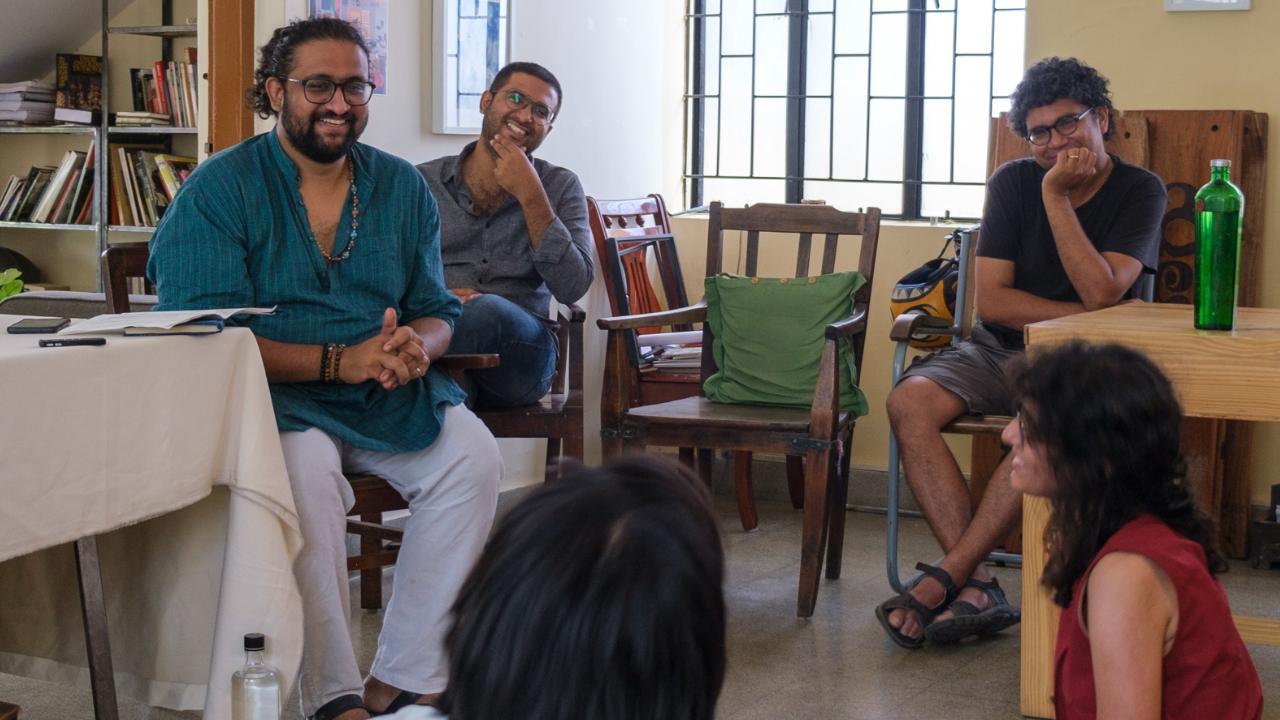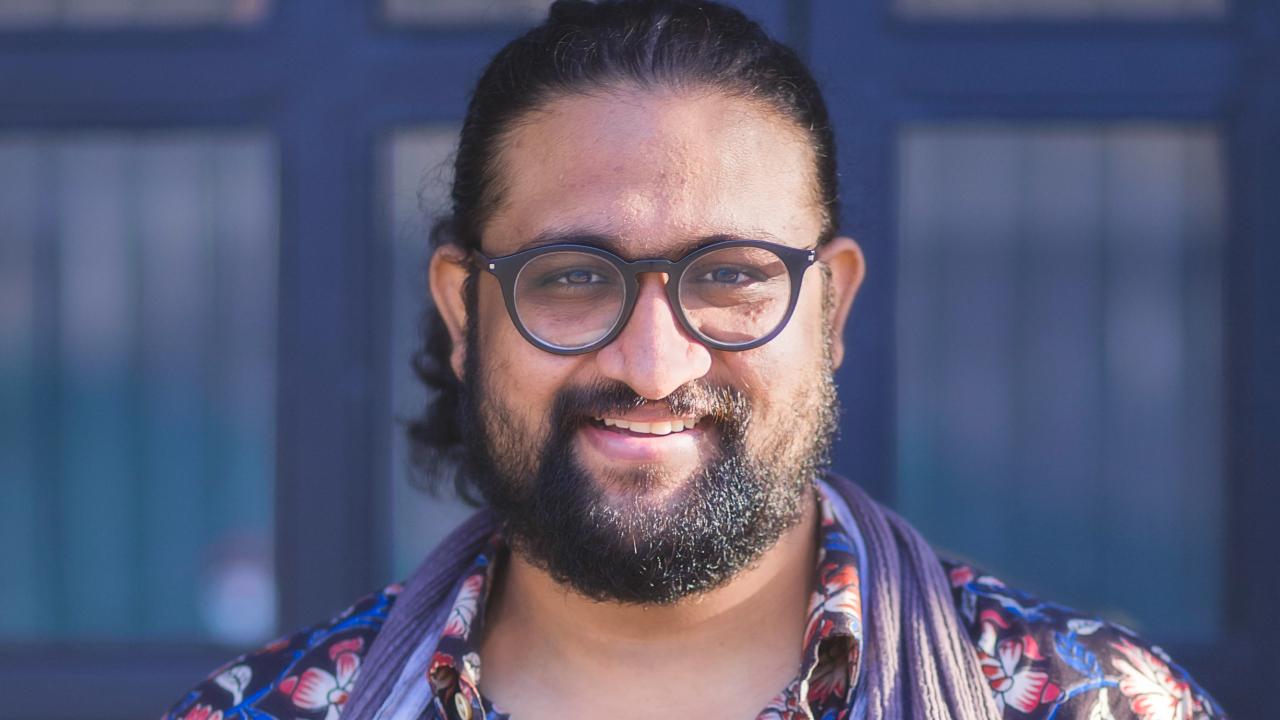Bengaluru theatre practitioner Sri Vamsi Matta is in Mumbai to engage people with an interactive performance, a Dalit food project, 'Come Eat with Me', where he talks about caste and pain, joy and celebration, and serves a platter of ‘memories of suppression’

Benglauru-based Dalit artist Sri Vamsi Matta started performing 'Come Eat With Me' in March 2022. Photo Courtesy: Sri Vamsi Matta
"Unlike many things in society," says Bengaluru-based Dalit theatre artist Sri Vamsi Matta, "people are really scared to talk about caste because the moment they do that, it makes them complicit and part of the problem. They don't want to accept that. So, caste is a very less spoken thing especially in progressive liberal circles where people talk about art, culture and dissent. Even when it is spoken about, it is looked at as a tragedy, where people say, 'oh, so sad'." However, Matta wants to change that narrative by telling his story.
After doing 22 shows in India since March 2022, the theatre practitioner is bringing 'Come Eat With Me', a thought-provoking and interactive performance to Mumbai this weekend. Both the shows are unfortunately already sold out. It is a performance that does not focus on ‘oh so sad’ part of the Dalit community but rather tells the community’s stories by celebrating their lives through the medium of food. Ever since Matta started performing it, the interaction has made members from the community feel like it is a place where they are seen and heard. He shares, "The stories of the marginalised communities are narrated as a tragedy. But, my show, talks about the pain, the joy and the celebration. It gives immense happiness and visibility." However, for members not from the community, it has always been about how they have never seen something like it before and makes them uncomfortable.
Caste and food
So, what is it about food that made Matta choose it to convey his stories to viewers? He explains, "I picked food because it is something you see at a very young age about how your food is different from the rest of the food around you, especially in schools. There are so many schools right now that have a restriction on what you can get in your lunchbox. It is not new. I am over 30 years old and when I was a kid there were issues with the food you get to school. So, food is something that irrespective of caste, class, gender and locality, everyone understands hunger, food and taste; the level of hunger and taste would be different but there is a level that people relate to and that's why I decided to use food to tell the story of caste."
 Sri Vamsi Matta says irrespective of caste, class, gender and locality that every one understands hunger, food and taste. Photo Courtesy: Sri Vamsa Matta
Sri Vamsi Matta says irrespective of caste, class, gender and locality that every one understands hunger, food and taste. Photo Courtesy: Sri Vamsa Matta
The fact that Matta loves food further aids him in telling the stories in the best way possible. "I'm a foodie and I'm interested in food, I like to cook and like to eat. But, when you look at the culinary history of India, you see there is a huge void in the documentation of food of the marginalised community and that is where I started. So, even though it is about culinary stories and traditions, it is stories about caste."
As a member of the Dalit community, he says, where generations have seen things not particularly good, it became imperative as an artist, for him to tell stories with caste at the centre. Interestingly, theatre came to Matta when he was a student of science at the Indian Institute of Science in Bengaluru. However, science as it is in India, the Bengaluru artist says, pushed him away. Incidentally, he was already a part of a vibrant student theatre community at the college and that paved way for him to pursue the art form further. There was also some influence at home, which he will talk more about in the performance, but reveals just enough for us to understand his influences. "My dad is a writer in Telugu, my mother tongue. Since childhood, my brother and I have had access to Telugu literature that is generally not available for other folks in my community. We are huge fans of Telugu cinema. I got interested in theatre and storytelling. So, that was the kind of impact I have had with theatre."
Coming together with the community
While Matta has had audiences of all kinds including people from the community and those outside of it, he is happy to have 'comrades', as he likes to call them, who have helped promote this form of art as far and wide as they could. At the same time, Matta says he isn't the only one talking about caste through food. So, when people tell him what he is doing is new, he says it simply is not.
He says, "There's Du Saraswathi from Bengaluru who does something similar. She talks about her childhood stories as she is cooking food on stage. Then there is Bengaluru-based Dr Sylvia Karpagam, who talks about nutrition, caste and how caste plays out in community medicine. There is Pune-based visual artist Rajyashri Goody who uses Dalit autobiographies to write recipes; Rahee Punyashloka, who goes by the name of @artedkar on Instagram, who writes extensively on caste; there is Big Fat Bao who talks about marginalised food through illustrations. So, I look at my work as a continuum of this larger movement and not an isolated one." Matta says that the work being done is part of a rich oral tradition, where these stories are told to younger generations and are passed on and none of it is new.
In fact, the Bengaluru theatre artist says all of the work that he has been doing is possible because of all the anti-caste communities on social media. "I owe it to all the anti-caste pages that have been created on social media because marginalised Dalit folk don't have the privilege of contact. Social media made it possible for me to reach out to people like Dr Silvia. Social media made it possible for me to see their work, reimagine what art is, what aesthetic is, what language is.” Matta says that when social media started, it aspired to be a democratic place. But, it is not anymore.
Interestingly, Matta says, 'Come Eat With Me', is a byproduct of a play he wrote during the Covid-19 pandemic called 'Star In The Sky'. "It is about Dalit students in government universities, loosely based on the life of Dr Rohith Vemula, who was institutionally murdered at the Hyderabad Central University." The play recently won at the Tata Literature Fest and was the runner up at the Sultan Padamsee Award For Playwriting too. In August, Matta will take his play overseas, as he will join as an artist in residence at the University of Wisconsin, Madison with their South Asian Languages and Cultural Centre, to take the conversation forward.
 Subscribe today by clicking the link and stay updated with the latest news!" Click here!
Subscribe today by clicking the link and stay updated with the latest news!" Click here!










